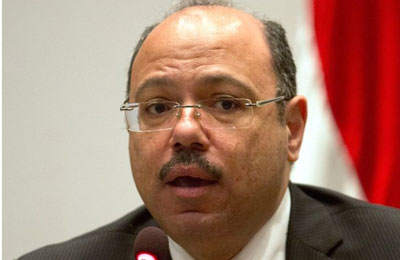
Egypt could tap global bond market after polls
Cairo, May 17, 2014
Egypt could tap global bond markets after presidential elections this month, but should the country be in dire need, it could seek aid from its wealthy Gulf neighbours, finance minister Hany Kadiri Dimian said.
Political turmoil following the uprising that toppled autocrat Hosni Mubarak in 2011 has hammered the economy of 85 million people as foreign investors and tourists have fled.
While the country has been making ends meet with the help of billions of dollars from the Gulf states, there are signs these flows could dry up. The UAE said this week it did not expect to disburse more aid.
Cairo has also held off signing a loan deal with the International Monetary Fund, saying it will assess this after presidential elections due in May 26-27.
Tapping global bond markets could be one option for raising cash, Hany Kadiri Dimian told an investment conference.
"We don't exclude any tool that will help us finance ourselves. Our (credit default swaps) have come down quite significantly," he added, referring to the cost of insuring the country's debt against default.
"We don't exclude (a bond) but don't expect to make a decision before the political transition is complete."
While Gulf countries pledged $12 billion in aid to Egypt last year, Dimian said Cairo was currently only receiving assistance in the form of oil products from Saudi Arabia, a programme that is to continue until August.
He added: "If we need assistance, I don't believe that our Gulf brothers will not respond positively," Dimian told Reuters Television in an interview.
Dimian said Egypt's budget for the 2014-2015 fiscal year does not assume any Gulf aid inflows, blowing out its budget deficit. Egypt's fiscal year runs from July 1-June 30.
"Under the 2014-15 fiscal year budget, our deficit will be around 14 per cent. If we don't do anything (on subsidies) this is our budget deficit," he said.
"This 14 per cent number does not include any grants. This year's deficit we expect at 11.5 percent of GDP as we benefited from the big cash grants coming from Arab countries."
On the positive side, elections hold out some hope of political stability and reform, especially to reduce wasteful subsidies such as on energy, which dwarf Egypt's education and healthcare spending and eat up a quarter of its budget.
The subsidy bill will fall by 20 percent in the 2014-2015 budget thanks to measures to reduce energy subsidies, the minister predicted.
"Our biggest task is to re-prioritise expenditures..phasing out energy subsidies is a medium-term programme, it will take us 3-5 years to break even," he said.
The government plans to introduce a smart card that would control the amount of fuel distributed at a subsided price. That alone could save around 1 percent to 1.5 percent of the country's $262.8 billion GDP this year.
To increase revenue collection, there are plans to introduce an additional 5 percent tax rate on high-income earners for a temporary period, Dimian said, adding that he hoped a value-added tax would be fully in place by next March.
Ending subsidies could however hurt profit margins at big Egyptian companies, Dimian said, noting many manufacturers enjoy subsidised energy bills but sell goods at international prices.
"Corporate profits may fall but they will continue to make profits," he added.-Reuters







